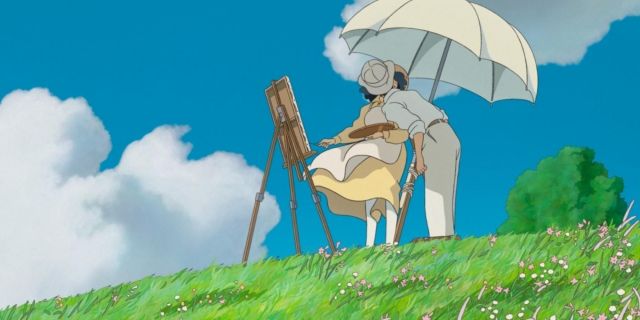Highlights
- The Wind Rises, a film by Hayao Miyazaki, divided Japanese viewers due to its portrayal of war, which conflicted with his anti-war stance.
- Miyazaki’s films consistently convey anti-war sentiments, emphasizing the destructive nature of conflict and fostering empathy for all sides.
- The film highlights the dilemma of following one’s dreams despite the ethical implications, receiving criticism for seemingly justifying the protagonist’s involvement in war.
Hayao Miyazaki films are, if nothing else, universally loved. It’s difficult to find people who outright hate his movies, and almost all of his films in Japan have been widely embraced by the public. Well…almost all of them. Despite Japan loving the man, one of his films did create a bit of a divide with Japanese viewers.
This film, while very well-made, said some things about human nature and war that many felt were conflicting with views he had made in previous films. What is this film, and what did it say that troubled so many Japanese viewers?
What is The Wind Rises?

The Wind Rises is a 2013 Japanese animated film written and directed by Hayao Miyazaki and produced by Studio Ghibli. The film is a fictionalized biographical account of the life of Jiro Horikoshi, an aeronautical engineer who designed fighter planes for Japan during World War II. Despite its historical backdrop, The Wind Rises primarily focuses on Jiro’s passion for aviation, his dreams of creating beautiful and innovative aircraft, and his personal and professional struggles.
The film combines elements of biography, romance, and fantasy, featuring his signature style of breathtaking animation, imaginative storytelling, and intricate attention to detail. As with most of his films, The Wind Rises received critical acclaim for its animation, storytelling, and portrayal of Jiro’s character (for the most part). The film was praised internationally and was nominated for the Academy Award for Best Animated Feature (it lost to Disney’s Frozen). One of the things that stood out though was its portrayal of war. Which (considering Miyazaki’s background) caused many viewers to raise an eyebrow.
What Does the Movie Tell Us About Miyazaki’s Views on War?

Hayao Miyazaki has consistently conveyed anti-war and anti-violence sentiments throughout his career. While he may not have provided a comprehensive statement of his views on war, his works and public statements reflect a strong pacifist perspective. For instance, Princess Mononoke and Howl’s Moving Castle both illustrate the destructive nature of conflict and its impact on both soldiers and civilians.
Additionally, his films frequently incorporate environmental themes that underscore the importance of nature and harmony with the environment. While these themes may not directly address war, they provide a stark contrast to the destructive aspects of warfare. Miyazaki’s humanistic approach in his storytelling also encourages empathy for characters on all sides of a conflict. He portrays individuals caught up in the chaos of war as multidimensional, fostering a deeper understanding of the human cost of such conflicts.
Publicly, Miyazaki has expressed his pacifist beliefs and criticized violence as a means to resolve conflicts. He advocates for peaceful solutions and promotes understanding among nations and cultures, and went so far as to refuse to go to America to collect his Academy Award for Best Animated Feature (which he won in 2001 for Spirited Away) as a means of protesting the Iraq War that was started by America. With this in mind, The Wind Rises caught many viewers by surprise.
Why Did the Movie Rub Some Japanese Audiences the Wrong Way?

While The Wind Rises may focus on a man aiming to create planes and follow his dreams of flight, the film also sparked discussions about the ethical implications of creating weapons of war and the role artists and engineers might play in such endeavors. The film’s title is derived from a quote by Paul Valéry:
The wind is rising! We must try to live.
On the surface, this seems like everything is in line with Miyazaki’s way of thinking. The issue is that Jiro is shown to be very much a sympathetic character who doesn’t really think much of the war or how his planes are being developed to be used in it. In fact, the war is such a backdrop for Jiro’s dreams and ambitions, that to some the movie almost seemed to justify his involvement in the war. Considering Jiro never has a moment where he has an epiphany that the planes he’s designed are being used to kill innocent people seems to go against his conscience that he wanted to design planes to make people happy.
When you also consider Miyazaki’s disdain for war that is seen in his films and in public comments, not only was it strange to have a protagonist whose creations contribute heavily to one of the biggest wars in history, but it was also strange that the man was seemingly given a pass for his contribution to that war. This seemed to be in stark contrast to a philosophy Miyazaki had for years, and some critics wondered why he made the film in the first place. Of course, Miyazaki is not an idiot; he knew what kind of film he was making.
The Wind Rises doesn’t give Jiro a pass for his contributions to the war so much as it highlights the dilemma of wanting to follow your dreams at all costs (even if following those dreams involves creating things that will ultimately destroy). If anything, Miyazaki was giving an olive branch to people who get involved in designing things for war, understanding that sometimes the need to create takes over your desire to do the right thing. Still, many Japanese viewers were bothered by this observation, and to date, The Wind Rises remains Miyazaki’s most polarizing film in his home country.











Leave a Reply